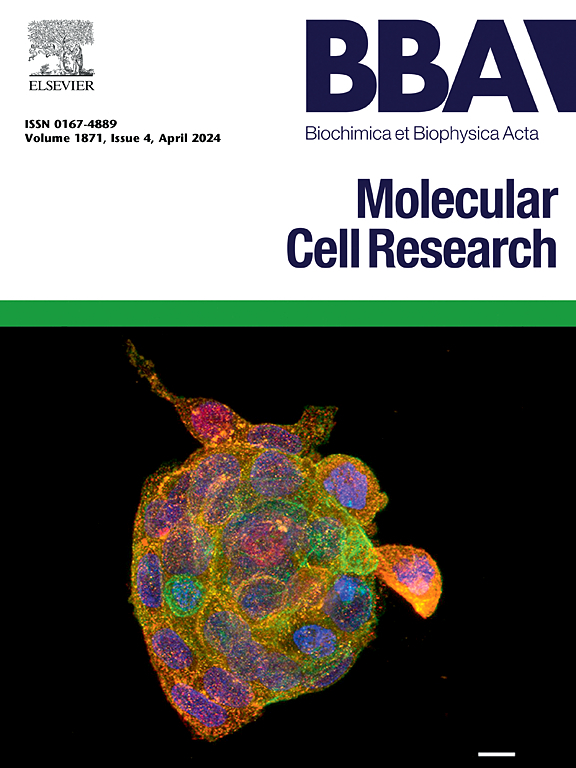ESCO2 drives breast cancer proliferation and metastasis through PI3K/AKT/mTOR phosphorylation: A potential therapeutic target
IF 3.7
2区 生物学
Q1 BIOCHEMISTRY & MOLECULAR BIOLOGY
Biochimica et biophysica acta. Molecular cell research
Pub Date : 2025-08-10
DOI:10.1016/j.bbamcr.2025.120043
引用次数: 0
Abstract
Breast cancer remains a major global health threat to women, underscoring the urgent need for novel therapeutic targets. While ESCO2, an essential cell cycle regulator, has been implicated in cancer progression, its precise role and molecular mechanisms in breast cancer remain poorly understood. In this study, we first demonstrated significant upregulation of ESCO2 in breast cancer through analysis of TCGA and GEO datasets, which was further validated in clinical specimens and cell lines, with its expression correlating with advanced T-stage, aggressive molecular subtypes and poor prognosis. Functional studies in MDA-MB-231 and MDA-MB-468 cells revealed that ESCO2 overexpression promoted cell proliferation, migration and invasion, while its knockdown exerted opposite effects. Mechanistic investigations uncovered that ESCO2 depletion reduced phosphorylation of PI3K/AKT/mTOR pathway components, and co-immunoprecipitation assays confirmed direct interaction between ESCO2 and PI3K. Importantly, the tumor-suppressive effects of ESCO2 knockdown could be rescued by SC79-mediated AKT activation. In vivo experiments using xenograft mouse models consistently showed that ESCO2 silencing significantly inhibited tumor growth, increased apoptosis and necrosis, and reduced metastasis. Collectively, our findings establish ESCO2 as a novel oncogene driving breast cancer progression through PI3K/AKT/mTOR pathway activation, highlighting its potential as a promising therapeutic target for breast cancer intervention.
ESCO2通过PI3K/AKT/mTOR磷酸化驱动乳腺癌增殖和转移:一个潜在的治疗靶点
乳腺癌仍然是全球妇女面临的主要健康威胁,因此迫切需要寻找新的治疗靶点。虽然ESCO2是一种重要的细胞周期调节剂,与癌症进展有关,但其在乳腺癌中的确切作用和分子机制仍知之甚少。在本研究中,我们首先通过TCGA和GEO数据集的分析证实了ESCO2在乳腺癌中的显著上调,并在临床标本和细胞系中进一步验证,其表达与晚期t期、侵袭性分子亚型和不良预后相关。对MDA-MB-231和MDA-MB-468细胞的功能研究表明,ESCO2过表达促进细胞增殖、迁移和侵袭,而其敲低则相反。机制研究发现,ESCO2消耗降低了PI3K/AKT/mTOR通路组分的磷酸化,共免疫沉淀实验证实了ESCO2和PI3K之间的直接相互作用。重要的是,ESCO2敲除的肿瘤抑制作用可以通过sc79介导的AKT激活来恢复。异种移植小鼠模型的体内实验一致表明,ESCO2沉默显著抑制肿瘤生长,增加细胞凋亡和坏死,减少转移。总之,我们的研究结果表明,ESCO2是一种通过激活PI3K/AKT/mTOR通路驱动乳腺癌进展的新型癌基因,突出了其作为乳腺癌干预治疗靶点的潜力。
本文章由计算机程序翻译,如有差异,请以英文原文为准。
求助全文
约1分钟内获得全文
求助全文
来源期刊
CiteScore
10.00
自引率
2.00%
发文量
151
审稿时长
44 days
期刊介绍:
BBA Molecular Cell Research focuses on understanding the mechanisms of cellular processes at the molecular level. These include aspects of cellular signaling, signal transduction, cell cycle, apoptosis, intracellular trafficking, secretory and endocytic pathways, biogenesis of cell organelles, cytoskeletal structures, cellular interactions, cell/tissue differentiation and cellular enzymology. Also included are studies at the interface between Cell Biology and Biophysics which apply for example novel imaging methods for characterizing cellular processes.

 求助内容:
求助内容: 应助结果提醒方式:
应助结果提醒方式:


